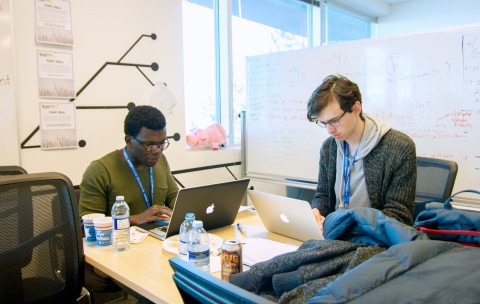Some experts devote their life’s work to solving issues in their fields, but participants in the 2019 Emerging Agriculture Hackathon at the University of Saskatchewan later this month will be challenged to solve issues in the agriculture sector in just six hours.
The fifth annual hackathon will be held in the Edwards School of Business on Jan. 18 and 19. The event will have groups create solutions to agricultural issues, and then, the participants will present to a panel of industry experts at the end of the second day.
The hackathon presents opportunities to learn through practicing skills, receiving feedback and networking as participants, speakers and volunteer mentors will be able to speak at the event.
Coral Willness, third-year psychology student and president of Emerging Agriculture, says participants in the hackathon do not have to be experts in any of the targeted fields of study. Students majoring in computer science, engineering, agriculture and commerce are all encouraged to sign up; simply just being interested in agricultural issues is enough to contribute.
“We can assure that, regardless of knowledge or experience, everyone has something to contribute to a team, whether it be a strong work ethic, enthusiasm, a good attitude [or] communication skills,” Willness said. “We do not expect our participants to have a lot of knowledge or experience in any of these areas, which is another reason why the mentors are of great help.”

The hackathon is also attended by mentors and a keynote speaker. This year, the speaker is entrepreneur Warren Bills, manager of business development at xarvio Digital Farming Solutions. Willness says mentors and speakers provide a necessary networking opportunity.
“We are very fortunate to have many influential people. This year, I will be making an effort to introduce all of the mentors and industry people in the room,” Willness said. “The keynote speech is an opportunity for those with little exposure to agriculture to get an idea [of] current developments in the field. We are excited to have Warren join us.”
According to Willness, whether or not the solutions that come out of hackathons are applicable to real-life problems is frequently a topic of conversation. She points to participants’ limited understanding of the challenges that farmers face as one of the possible limitations of such an event. In an online article, Willness points out that “a lot of the hackathon ideas haven’t been implemented in the agricultural industry.”
This year, farmers are invited to attend the event and pitch ideas for participants to work on. Willness says this will result in more applicable solutions.
“This year, we replaced the panel discussion with project pitches. We are trying to identify real issues in the industry that the participants can work on, with the hope that [their solutions] can actually be implemented in the industry,” Willness said. “We aspire to address agricultural issues and propose solutions that are feasible, applicable and can bring value to the AgTech industry.”
Previous Emerging Agriculture Hackathons have been consistent with around 15 to 20 participants involved. Willness says that they are always looking for more attendees, particularly those with an interest in agriculture.
“We are trying to have more students with agricultural knowledge participate as our participants have been largely from computer science,” Willness said. “AgTech is definitely a developing area, which has a lot of interest right now, so that is awesome. Each year, we are reaching more people and companies.”
—
Ana Cristina Camacho / Staff Writer
Photo: Riley Deacon / Photo Editor
Leave a Reply